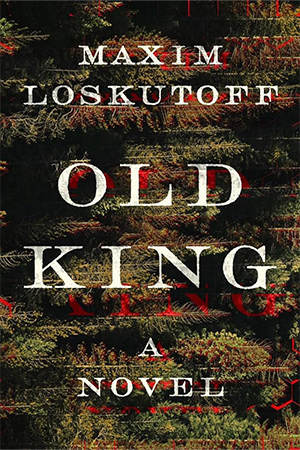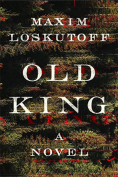Old King by Maxim Loskutoff
 New York. W. W. Norton. 2024. 304 pages.
New York. W. W. Norton. 2024. 304 pages.
Old King is basically a novel about two very different men, Duane Oshun and Ted Kaczynski, mostly about the former. The novel opens with Duane burgling his ex-wife’s Salt Lake City home to steal a microwave oven he had given her when they were married. He then drives into the sunset minus skills, money, or a plan. Duane rather aimlessly points his battered pickup north, possibly to Canada. He runs out of funds in Lincoln, Montana, and ends up staying a while. His persona reminded me of Harry “Rabbit” Angstrom in John Updike’s series that began with Rabbit, Run. Duane has a similar lost, out-of-step innocence.
Duane gets odd jobs, such as splitting wood for a local minister. He meets and later dates Jackie, the waitress at a Lincoln diner. It is largely through that relationship that Old King’s other characters are introduced. Duane’s life begins to have solidity, including summer visits from his growing son, Hudson, who lives with his mother in Utah. He builds a cabin, it turns out, near Ted Kaczynski’s. Ted is portrayed as reclusive and almost contorted by rage against an increasingly technological and pervasively controlling society, especially as it encroaches on his own freedom and autonomy. Maxim Loskutoff underlines Kaczynski’s hatred as Ted begins his practice of sending ever more powerful bombs to technology’s agents and designers. There is an abiding ruthlessness, but also traces of fear and guilt.
Some years after the main storyline of Old King, I visited Kaczynski at his request in the Sacramento County jail. We had three visits in 1997, before he was given a life sentence in early 1998. He was friendly and soft-spoken, sharing how puzzled he was at his sentencing when relatives of his victims gave emotional testimony. He couldn’t understand why they were upset. Our conversations weren’t of a personal nature but focused mainly on our shared critique of technological society. Ted came across as a bit shy, not at all psychotic. Suffering from cancer at a federal prison hospital in 2023 just before Old King appeared, he took his own life.
In this part of western Montana, there is anger and anxiety not confined to the likes of Ted. Lincoln and its environs are changing, mostly because of clear-cut logging and an influx of tourists. And our author seems to share a general, even pointed conclusion like Ted’s: “The town’s picturesque face was a lie, hiding the rot at the core of every American community.”
The novel’s third main character is the locale in which it takes place. It is a vivid presence on virtually every page. Loskutoff was and is a resident of western Montana, not so far from the location of Duane’s and Ted’s cabins. He was a teenager when the Unabomber case made headlines from 1995 to 1998. It is the geographic proximity more than anything else where the two main figures intersect, but they also share a love for the beauty of the valleys, peaks, and forests of this part of the Rockies.
Other important characters include Mason, a forest ranger fighting a losing battle to defend wildlife from traps and other aspects of the despoliation of their habitat. His friend, an old local named Hutch, is his partner in this effort. Then there’s postal inspector Nep, engaged in a fruitless hunt for the Unabomber. Only toward the end of the book do we learn where it gets its title. Old King is an old Douglas fir, supposedly the tallest in the valley. It presides over the forest; for Ted it is a kind of totem, a holy survivor.
The way the novel is set up and unfolds, I imagine that most readers might tend to expect that the lives of Duane and Ted will somehow connect. But, as I’ve said, they only intersect, without much of any connection. Yet it is also true that every significant figure in Old King does connect in a sense; they all share an anxiety, a sense of loss regarding what’s coming down the road.
John Zerzan
Eugene, Oregon































